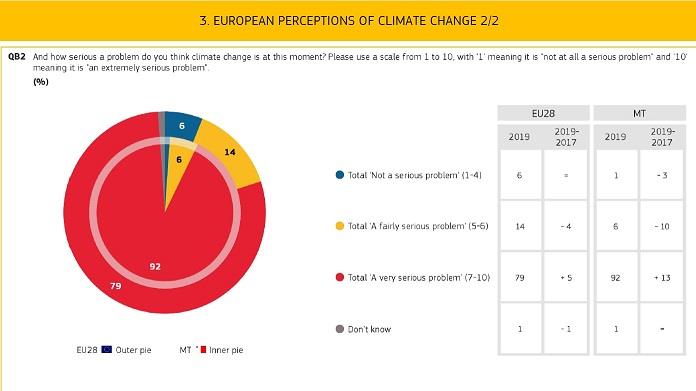At 92 per cent of the population, the Maltese are the most concerned Europeans when it comes to defining the burning issue of climate change as a “very serious” problem.
Over and above that, the Maltese appear to be developing a stronger environmental consciousness, with concern about climate change having risen by 13 percentage points since 2017, according to a special Eurobarometer survey on climate change published on Wednesday.
Malta’s impression that climate change is the most serious problem facing the world, meanwhile, grew from 13 to 23 per cent, while personal action taken to fight climate change has also increased drastically, 88 per cent, by 13 percentage points and stands the highest in the bloc.
In fact, the only area where Malta appears to stand below the EU average is in the regular use environmentally-friendly alternatives to the family car, where Malta stands below the EU average but where the country has bettered itself by 13 percentage points since 2017.
Admittedly, Malta is a country that stands to lose out more than others should the devastating effect of climate change rear its ugly head, with the threat of hotter temperatures, further desertification, lack of water resources and coastal flooding being pressing problems for Malta.
The survey research has been conducted back in April and the report was published this week.
And that was before climate and environmental concern was heightened recently with students having taken to the streets in a climate march, and with the more recent tree-chopping saga having also creating widespread environmental concern.
Whatever the case, the amount of people in Malta considering climate change to be a “very serious” problem – no less than 92 per cent - is heads and shoulders above the EU average of 79 per cent.
Malta’s 92 per cent concern rating also represents an increase of 13 percentage points since the previous survey in 2017.
The proportion of Maltese who see climate change as the most serious problem facing the world - 33 per cent - is well above the EU average of 23 per cent), and had increased by 20 percentage points in the same period.
Spain, another country facing climate change’s more dire effects, is the second-most concerned country after Malta, with 89 per cent registering serious concern.
In contrast, the lowest rates were recorded in the somewhat colder Latvia and Estonia, 59 per cent, and in Romania, 66 per cent.
Moreover, almost nine in 10 respondents Maltese (88 per cent) say that they have taken personal action to fight climate change in the past six months, the highest level of any Member State, where the average is 60 per cent - an increase of 13 percentage points since 2017.
Over eight in 10 of Maltese surveyed say that they try to reduce waste and regularly separate it for recycling – 85 per cent versus the EU average of 75 per cent.
The proportion of Maltese who have installed equipment in their home to reduce energy consumption has increased by nine percentage points since 2017 and stands significantly higher than the EU average – 24 per cent against 16 per cent.
There has also been a 13 percentage point increase in the proportion of respondents who regularly use environmentally-friendly alternatives to the family car. This stands at 31 per cent but remains below the EU average of 37 per cent.
There has been a two percentage point increase since 2017 in the proportion who agree that more public financial support should be given for the transition to clean energies – 92 per cent, above the EU average of 84 per cent - and the proportion who agree that promoting EU expertise in clean technologies to countries outside the EU can benefit the EU economically - 84 per cent versus the EU average of 81 per cent.
Respondents in Malta are the most likely of any Member State to agree adapting to the adverse impacts of climate change can have positive outcomes for citizens (88 per cent against the EU average of 70 per cent.
A large majority of respondents from Malta, 97 per cent of Maltese versus the EU average of 92 per cent, support the aim of the EU becoming climate-neutral by 2050.

How the Maltese are personally addressing climate change
92% see climate change as a very serious problem’ – up 13 pp since 2017
33% see it as the most serious problem facing the world – up 22 pp
88% have taken personal action to fight climate change in the past six months – up 13 pp
85% try to reduce waste and regularly separate it for recycling (in April)
24% have installed home equipment to reduce energy consumption – up 9%
31% regularly use environmentally-friendly alternatives to the family car – up 13%
92% feel incentives should be given for transition to clean energies – up 2%
97% support the EU becoming climate neutral by 2050